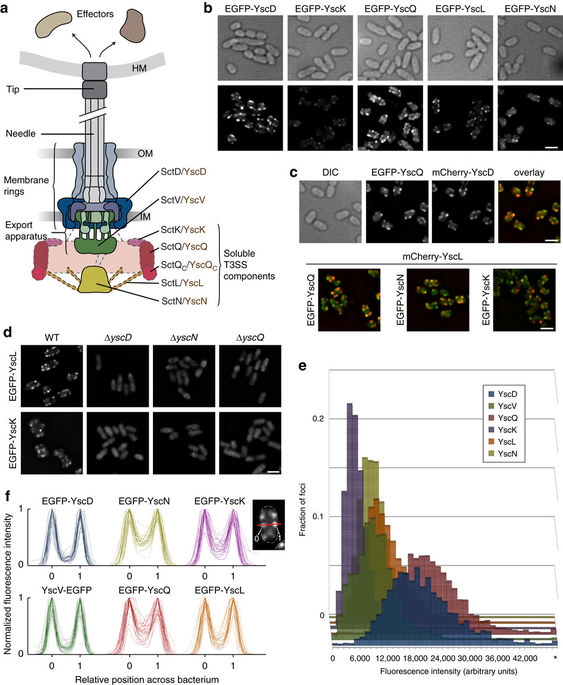当前位置:
X-MOL 学术
›
Nat. Commun.
›
论文详情
Our official English website, www.x-mol.net, welcomes your
feedback! (Note: you will need to create a separate account there.)
A dynamic and adaptive network of cytosolic interactions governs protein export by the T3SS injectisome.
Nature Communications ( IF 14.7 ) Pub Date : 2017-06-27 , DOI: 10.1038/ncomms15940 Andreas Diepold 1 , Erdinc Sezgin 2 , Miles Huseyin 1 , Thomas Mortimer 1 , Christian Eggeling 2 , Judith P Armitage 1
Nature Communications ( IF 14.7 ) Pub Date : 2017-06-27 , DOI: 10.1038/ncomms15940 Andreas Diepold 1 , Erdinc Sezgin 2 , Miles Huseyin 1 , Thomas Mortimer 1 , Christian Eggeling 2 , Judith P Armitage 1
Affiliation

|
Many bacteria use a type III secretion system (T3SS) to inject effector proteins into host cells. Selection and export of the effectors is controlled by a set of soluble proteins at the cytosolic interface of the membrane spanning type III secretion 'injectisome'. Combining fluorescence microscopy, biochemical interaction studies and fluorescence correlation spectroscopy, we show that in live Yersinia enterocolitica bacteria these soluble proteins form complexes both at the injectisome and in the cytosol. Binding to the injectisome stabilizes these cytosolic complexes, whereas the free cytosolic complexes, which include the type III secretion ATPase, constitute a highly dynamic and adaptive network. The extracellular calcium concentration, which triggers activation of the T3SS, directly influences the cytosolic complexes, possibly through the essential component SctK/YscK, revealing a potential mechanism involved in the regulation of type III secretion.
中文翻译:

胞质相互作用的动态和自适应网络控制着 T3SS 注射体的蛋白质输出。
许多细菌使用 III 型分泌系统 (T3SS) 将效应蛋白注入宿主细胞。效应器的选择和输出由跨膜 III 型分泌“注射体”的胞质界面处的一组可溶性蛋白质控制。结合荧光显微镜、生化相互作用研究和荧光相关光谱,我们表明在活的小肠结肠炎耶尔森菌中,这些可溶性蛋白质在注射体和胞质溶胶中都形成复合物。与注射体的结合稳定了这些胞质复合物,而游离的胞质复合物,包括 III 型分泌 ATP 酶,构成了一个高度动态和适应性的网络。触发 T3SS 激活的细胞外钙浓度直接影响细胞溶质复合物,
更新日期:2017-06-28
中文翻译:

胞质相互作用的动态和自适应网络控制着 T3SS 注射体的蛋白质输出。
许多细菌使用 III 型分泌系统 (T3SS) 将效应蛋白注入宿主细胞。效应器的选择和输出由跨膜 III 型分泌“注射体”的胞质界面处的一组可溶性蛋白质控制。结合荧光显微镜、生化相互作用研究和荧光相关光谱,我们表明在活的小肠结肠炎耶尔森菌中,这些可溶性蛋白质在注射体和胞质溶胶中都形成复合物。与注射体的结合稳定了这些胞质复合物,而游离的胞质复合物,包括 III 型分泌 ATP 酶,构成了一个高度动态和适应性的网络。触发 T3SS 激活的细胞外钙浓度直接影响细胞溶质复合物,





















































 京公网安备 11010802027423号
京公网安备 11010802027423号